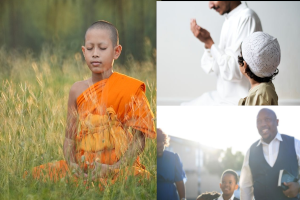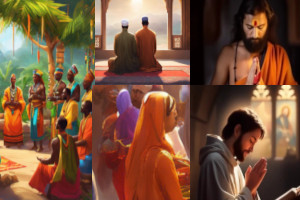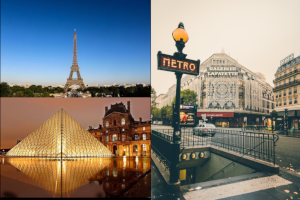In a world filled with diverse beliefs, traditions, and practices, spirituality has often been misunderstood and misrepresented. While it’s a concept that dates back thousands of years and touches nearly every aspect of human life, misconceptions about spirituality abound. Many people equate it with organized religion, think it’s all about meditation or chanting, or see it as something “mystical” or “supernatural.” However, spirituality is a deeply personal journey, far more complex and nuanced than the common misconceptions surrounding it. In this article, we’ll explore some of the most prevalent myths about spirituality and uncover what it truly means to be spiritual.
#### **Misconception 1: Spirituality Is the Same as Religion**
One of the most common misconceptions about spirituality is that it is synonymous with religion. While there is some overlap, the two are not the same. Religion generally involves a specific set of beliefs, rituals, and practices centered around a deity or deities, often shared within a community or institution. In contrast, spirituality is a broader concept that pertains to a person’s sense of connection to something greater than themselves, which may or may not involve organized religion.
Spirituality is about personal growth, inner peace, and self-discovery. It can involve religion, but it doesn’t have to. A person might consider themselves spiritual without adhering to any religious dogma. For instance, someone might feel a deep connection to nature, art, or humanity and find spiritual meaning in those experiences. On the other hand, a religious person may follow certain rituals but not necessarily engage in spiritual exploration or self-reflection.
#### **Misconception 2: Spirituality Is About Escaping Reality**
Another common misconception is that spirituality is a form of escapism—an attempt to flee from the real world and its challenges. This idea often comes from the stereotype of a spiritual person as someone who retreats to the mountains, meditates for hours, and avoids worldly responsibilities.
However, genuine spirituality encourages a profound engagement with life rather than an escape from it. It involves being fully present, mindful, and aware of one’s thoughts, emotions, and actions. Spirituality is about facing challenges with a sense of purpose and growth rather than avoiding them. It asks difficult questions, promotes introspection, and seeks understanding, compassion, and empathy in the face of life’s struggles.
Many spiritual practices, like mindfulness, meditation, or yoga, are designed not to distract from reality but to help individuals navigate it with more clarity, calmness, and insight. Spirituality can be about finding deeper meaning in everyday actions and learning to live authentically and compassionately amid life’s inevitable ups and downs.
#### **Misconception 3: Spirituality Requires a Specific Practice or Lifestyle**
A prevalent myth about spirituality is that it must involve specific practices like meditation, yoga, or chanting, or require adopting a certain lifestyle, such as becoming vegan or abstaining from alcohol. While these practices can be spiritual for some people, they are not prerequisites for spirituality.
Spirituality is deeply individual and subjective. For one person, it might involve daily prayer or meditation; for another, it could be hiking in the mountains, creating art, writing, or volunteering. What makes an experience spiritual is not the activity itself but the intention behind it—the desire for inner peace, connection, growth, or understanding.
It’s important to recognize that spirituality doesn’t have a one-size-fits-all formula. There’s no rulebook that dictates how one should practice spirituality. Each person’s spiritual journey is unique, and what feels meaningful to one may not resonate with another. The true essence of spirituality lies in authenticity and self-discovery.
#### **Misconception 4: Spirituality Is Only for the Privileged**
Some people perceive spirituality as a luxury reserved for those who have the time, resources, or leisure to engage in spiritual practices like retreats, yoga classes, or meditation sessions. This misconception can create a false divide, suggesting that spirituality is only for the wealthy, educated, or enlightened.
In reality, spirituality is accessible to everyone, regardless of socioeconomic status, education, or cultural background. It doesn’t require expensive retreats, special equipment, or hours of free time. Spirituality can be practiced in the simplest of moments—through acts of kindness, moments of reflection, or even a quiet walk in nature.
In many cultures and communities around the world, spirituality is woven into the fabric of daily life. It’s found in the way people care for each other, their connection to their ancestors, and their relationship with the natural world. Spirituality is a fundamental human experience that transcends economic or social status.
#### **Misconception 5: Spirituality Is About Being “Good” or “Perfect”**
Another misconception is that spirituality requires a person to be morally superior, perfect, or always positive. This belief often leads to a distorted view of spirituality, where people feel they must constantly suppress negative emotions or present themselves as perpetually kind and peaceful.
True spirituality acknowledges the full range of human emotions and experiences. It embraces both light and shadow, recognizing that growth often comes from facing one’s flaws, mistakes, and vulnerabilities. Spirituality is not about perfection; it’s about being honest with oneself and striving for authenticity.
Being spiritual doesn’t mean being immune to anger, sadness, or frustration. It means acknowledging these emotions, understanding their root causes, and learning from them. Spirituality involves a continuous process of self-exploration, self-acceptance, and self-growth. It’s about understanding that being human is a complex, messy, and beautiful journey.
#### **Conclusion: Embracing a Broader Understanding of Spirituality**
Spirituality is a deeply personal and varied journey that defies a single definition or rigid set of rules. It is not confined to religious beliefs, specific practices, or a particular lifestyle. Nor is it an escape from reality or a pursuit reserved for the privileged or the perfect.
Ultimately, spirituality is about seeking a deeper understanding of oneself and the world, finding meaning and purpose, and cultivating a sense of connection, peace, and compassion. By breaking free from misconceptions, we can allow ourselves and others to explore spirituality in a way that feels true and meaningful to each individual.
In a world that often divides, spirituality has the power to unite—by encouraging us to look within, reach out, and recognize the common thread that binds all of humanity.



